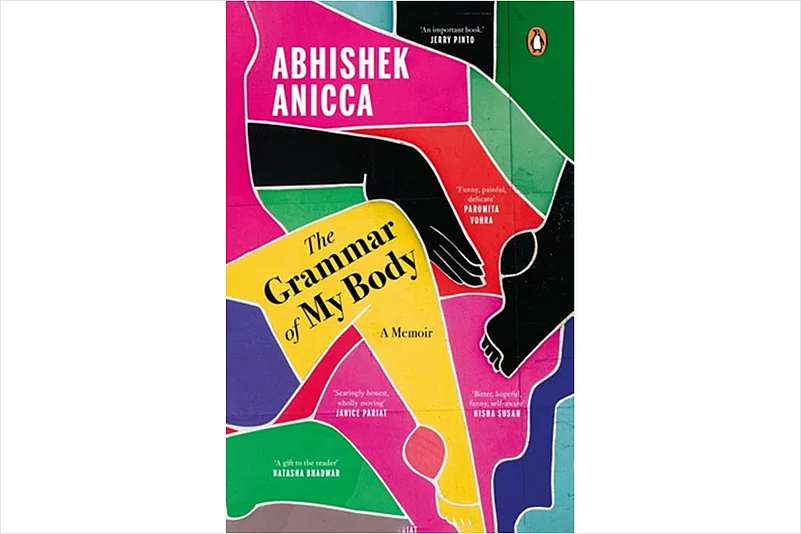Cake
Book Excerpt: 'The Grammar Of My Body' By Abhishek Anicca
Abhishek Anicca’s The Grammar of My Body is a collection of essays on disability, love, and self-discovery

I used to cut myself into pieces
offer it to strangers
for validity
They never had the appetite
and left me bleeding
incomplete
If I could just eat all the pieces
of my unrequited self, maybe
I can be whole again?
It’s all conditioning. Take a deep breath. Everyone is attractive. Everyone is desirable. It’s just your internalized ableism. Try. Just Try. No? Still not happening?
Truth be told, I can’t be attracted to everyone and anyone around me. It doesn’t work like that. Does emotional connection matter? Yes. Intellectual connection? Yes, that too. Do bodies matter? Bodies that are fat. Bodies that are ‘incomplete’ or not ‘functional’. Bodies that look different. Yes. Bodies matter. They do.

‘How will you have sex with someone?’ asked an old schoolmate of mine a few years ago. We weren’t talking about sex. Maybe he thought it would be funny to talk about my sex life. There was a joke camouflaged in that entire conversation that I couldn’t find. How could a disabled, fat guy have sex? Just imagining it is funny for some. It’s an ‘ugly image’ even to picture it. And funny in equal parts. Hahaha. The joke’s on you.
The joke’s on me, all right. And many disabled persons like me who have to continuously defend their bodies. Defend their desires. But we all have desires, don’t we? Disabled, able-bodied, everyone. And we also want to be desired? That’s what we want. To be desired by someone. To be considered attractive by just one, if not more. We are desperate for that acknowledgement. Disabled persons too. Our bodies have been shamed and stared at for centuries. We have been forcibly sterilized, considered unproductive for society, killed in gas chambers. And here we are and all we want is to be respected and desired. The joke’s on you, society.
The social model of disability is useful in the classroom situation. But it falls apart when it comes to private conversations. Let me show you an example.
Notes on (gender-neutral) disabled rejection:
(Based on fictional characters and events)
Person 1: I love you/I am attracted to you/Will you be my partner?/I can’t live without you.
Person 2: You know I really like you and we are very good friends, but I am not attracted to you. Sorry!
Person 1: Why aren’t you attracted to me? Is it because I am disabled?
Person 2: No. I am just not attracted to you. It’s nothing to do with your disability.
Person 1: ?It has everything to do with my disability! It’s your internalized ableism. Society has told you what kinds of bodies are attractive and the kinds that are not.
Person 2: ?Do you think I am just another person who does what they are told by society? HOW DARE YOU!?
Person 1: ?No, you are special. That’s why I love you.
Person 2: ?Yes, I am special. And I get attracted to only certain special people. Please understand.
All of us: Waiting for Godot.
Note: To tell someone that they are not attracted to disabled bodies because they have been trained that way by society can be an unhelpful argument, especially when you are proposing to someone.
Some days I want to break free. Free from social models and society itself. Free from my own insecurities. And go back to who I am, a true romantic. I believe in love.
But wait, who do disabled people often get attracted to? Answer: The most beautiful, able-bodied people around them. It’s only natural, na? Maybe it is also how we have been conditioned. Our internalized ableism. No?
But maybe we are wrong. Maybe it’s not simply society’s conditioning that determines who we are attracted to. How does attraction work anyway? Okay, hormones play a role. Got that. Testosterone and Oestrogen. But what makes them flow? What about people who identify as sapiosexuals? Are they all lying on dating sites? Is it all a scam? What about those wonderful stories where disabled people find love? Are they just well-told stories that can’t be replicated?
I have no answers. I don’t think anyone has. It is impossible for most of us to explain why we get attracted to certain things or certain people. What turns us on. What turns us off. Of course, we have desires. But at some point in time, we want to be desired too. It’s a very human need. Imagine being disabled. Imagine being constantly reminded that you might never find someone who desires you, your body.
Some days I want to break free. Free from social models and society itself. Free from my own insecurities. And go back to who I am, a true romantic. I believe in love. I believe there is something more to who we are than just social conditioning. And time and again, I have been surprised by life in beautiful ways. Intimacy has knocked on my door when I least expected it. But love still seems far away. And there are questions that remain unanswered. But it makes me hopeful. Who knows, there might be a love story waiting for all of us. But till then, we must fight and explain and point out how society continues to marginalize us in little ways. We must not get bitter. It will only poison us. And make us unattractive.
(This appeared in the print as 'Rules Of Attraction')


























